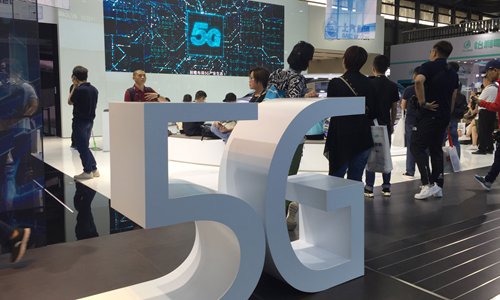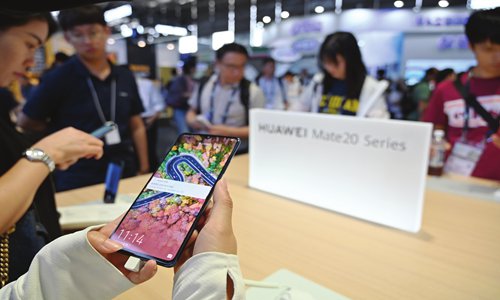CES Asia features 5G’s future
Collaboration to boost innovation, breakthroughs: expert

Chinese automaker SAIC Motor showcases its 5G-powered remote driving system at CES Asia 2019. Photo: Wang Yi/GT
Hundreds of exhibitors gathered on Tuesday in Shanghai at CES Asia 2019, where cutting-edge technologies such as 5G, artificial intelligence (AI) and the Internet of Things (IoT) are being showcased.
Despite the US-led clampdown on China's rise in high technology, industry representatives are moving toward closer collaboration, a must for the future of technology.
The tech fest, organized by the US Consumer Technology Association (CTA), welcomed a large number of visitors, many of whom were from the US. The new tech cold war initiated by the US government has not dampened the enthusiasm of American tech firms to seek cooperation in technology in China, particularly when the country is now leading in the next generation of wireless technology.
The trade war is bad for every country involved, and with new technologies like AI and 5G coming to life… China is positioning itself as a world leader, which is why the CTA is hosting the event here, Gary Shapiro, president and CEO of the CTA, said in a keynote speech on Tuesday.
Representatives of the Dow Chemical Company and Fossil Group - two US firms at the event - told the Global Times that they value the Chinese market as their long-term strategy. Some analysts predicted that China-US decoupling in the tech sector is unlikely as cooperation is an irreversible trend.

Visitors browse new Huawei smartphones at the company's booth at CES Asia 2019, in Shanghai on Tuesday. The exhibition features cutting-edge technologies such as 5G, artificial intelligence and the Internet of Things. Photo: AFP
The event came after the Ministry of Industry and Information Technology officially issued 5G licenses to major carriers, ushering in a 5G era that creates innovative and lucrative business models. People will be able to turn on their air conditioners before arriving home, and remotely monitor the refrigerator. They will be able to keep their hands off the wheel while driving, and control devices with their voice, just like Iron Man. All these scenarios will soon become reality with the help of 5G-powered networks, which are considered 100 times faster than 4G with low latency.
At the booth of Chinese automaker SAIC Motor, a visitor tried out a 5G-powered driving system, which enables the driver to control a vehicle about 50 kilometers away. An employee told the Global Times that this system can be used for rescue work in disaster-hit areas.
5G will accelerate the development of autonomous driving. HoloMatic, a Chinese start-up company focusing on autonomous driving, said it is working with major telecom carriers to develop self-driving tests in the country, and 5G technologies provide the safest and most stable networks.
Huawei, a major global player in 5G deployment, was also under the spotlight. Besides its competitive businesses, such as telecoms equipment and smartphones, Huawei has been moving into new territory like autos and smart homes by providing communications hardware.
"Huawei is an important partner of Audi in coming up with standards for connected cars, and our partnership with Huawei will enable users to soon enjoy new automotive technologies," Yin Xiaohang, a senior executive of Audi China, told the Global Times on Tuesday.
Other Chinese companies have also signed cooperation agreements with Chinese telecom carriers to tap into more application scenarios powered by 5G. Major Chinese retailer Suning teamed up with China Unicom on Tuesday to establish a 5G smart retail lab to develop targeted services based on big data and all connected hardware and products.
Collaboration is the future
While the US continues to curb Chinese tech firms amid an escalating trade war, industry representatives agree that collaboration is the future, which will also boost innovation and achieve technological breakthroughs.
"This attitude is reflected in the growing interest for tech events like CES Asia," Li Yi, a senior research fellow at the Shanghai Academy of Social Sciences' Internet Research Center, told the Global Times on Tuesday.
As industry standards have been jointly established by various nations, they are also unlikely to isolate themselves from the global community in the 5G era, Li noted.
For instance, 5G patents developed by Chinese companies and institutions including Huawei, ZTE and the Chinese Academy of Telecommunications Technology, accounted for 40 percent of total patents globally, media reported on Tuesday, citing patent data firm IPlytics. The international body responsible for setting 5G standards 3GPP also warned that blacklisting Huawei will have a dramatic impact on the future of standardization.
"It will be exciting to see 5G-powered applications, as devices will all be connected and I can use voice assistance to control them," a white-collar worker surnamed Li who lives in Shanghai, told the Global Times at the event.